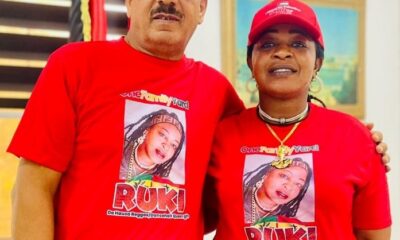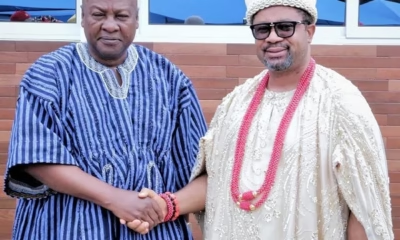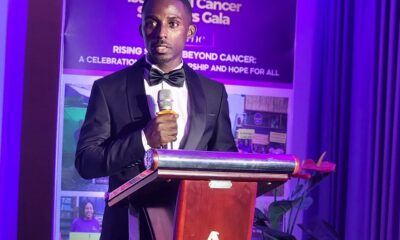Features
Dear President Mahama
Published
4 months agoon
Congratulations on your resounding victory in this election. I am certain that many view this victory as a time for celebration, relishing the fruits of a hard-fought battle.
However, the nature of your victory brings with it an unprecedented responsibility that will require extraordinary talents to tackle and ultimately overcome the imminent challenges we all face. Mr President, your victory on 8th December 2024 has sparked a massive turnout from the youth, which makes this immense responsibility even more evident.
Mr President, may I take the liberty of drawing a connection between your extraordinary victory and the experiences of the people during your first term as President (2012–2016)? A direct comparison has made it easy for Ghanaians to swiftly recognise the difference between you and your opponent.
The title of this letter implicitly suggests solutions to some of the most persistent and chronic bureaucratic hurdles within Ghana’s governance structure. Mr Mahama, as Dr Kwame Nkrumah once said, “Unless Our Economic Development Is Rocket Propelled, We Risk Losing Everything We Ever Fought For.” He also remarked in several interviews, “You do not have to know how to do everything, but where to find what you need.”
Mr Mahama, the average Ghanaian wishes for your success, and it is for this reason that I write this letter. When we look around the industrialised world—especially in North America, Europe, and parts of Asia—and contemplate its entirety, we are likely to discover that it functions as one great machine, subdivided into countless smaller ones.
These machines, and their components, are structured, engineered, and adjusted to work in harmony with an accuracy that commands admiration. As we’ve all come to realise, the transformations in developed societies, particularly in Rwanda, South Korea, China, Singapore, and Malaysia, are no accident. They are the result of structured ideas based on the principles of pragmatic scientific socialism, fuelled by controlled capitalism and carried out by men of courage and action.
Whether or not we achieve success as a nation by the end of 2028 depends largely on those closest to you, hence the title of this letter. Mr President, one of the most striking observations from a two-year study of 10 emerging economies in the last three decades was Leadership Accessibility. Though your outstanding victory reflects the collective effort of the NDC party hierarchy, the ideas necessary to propel our country may not necessarily come from within the party. For us to succeed, we MUST ensure that there is an Access Window open to non-political Ghanaian talents.
The impenetrable barrier of concrete and steel around the presidency, with no bridge to the ordinary Ghanaian, is a major stumbling block that must be dismantled. This barrier prevents the discovery of homegrown innovations and transformational ideas, which have always been the reserve of the citizens. Mr President, I am greatly inspired by the humility you have shown in the aftermath of your emphatic victory, as well as the wisdom demonstrated since.
Sir, Ghana’s situation may be diagnosed as follows: we have a goal, but the challenge lies in how to achieve it. In Ghana and much of sub-Saharan Africa, we often attempt to adapt means to predefined ends (e.g., we want to build a house, a ship, or grow cassava).
While we may be skilled at these tasks, there is no single way of thinking that enables us to achieve every goal. The person who knows how to build a house does not necessarily know how to build a ship or grow cassava.
Mr President, I am deeply passionate about this because I believe our current socio-political structures and governance approach will undermine the efforts of any local genius attempting to succeed within Ghana’s boundaries. We may have our own Elon Musk within us, but whether or not he or she succeeds depends on the accessibility of leadership, as mentioned above.
Acknowledging that only God can be everywhere at once, it is clear that your ears cannot be everywhere at the same time. This highlights the necessity of surrounding yourself with the sharpest minds from all fields to help you navigate this era of socio-economic distress and crises.
Your Excellency, in 1980, as a 7-year-old boy at Airforce Primary School in Takoradi, my favourite teacher, Auntie Beatrice, did not return after vacation. I later learned that she died during childbirth while we were on break. Fast forward 45 years to 2025, and maternal mortality continues to be a rampant issue, with women dying needlessly during labour.
This tragedy can be stopped or significantly reduced, yet the idea to curb these maternal deaths may not necessarily come from your appointed cabinet ministers but from the general public. The problem, however, is that it is almost impossible for an unknown individual— no matter how brilliant they may be—to put forward an idea and see it implemented within our current governance structure.
Mr President, those closest to you should not fear new or unfamiliar ideas, for no nation has ever prospered without them. They must show their love for you by embracing new ideas that support your vision for socio-economic transformation.
This is fundamentally important, as modern economic progress relies on innovation and pragmatism, not solely on old fiscal policy strategies. The success of Lee Kwan Yew in Singapore, who adapted many of Dr Nkrumah’s ideas—even though he did not acknowledge it in his book From Third World to First World—focused on what worked, not on what appeared to work elsewhere, especially in the West.
While capitalism is beneficial, it is seldom achieved by governments leaving local businesses and entrepreneurs to survive on their own in today’s fiercely competitive marketplace. It is the primary responsibility of governments, especially those of post-colonial countries, to deliberately create wealth and transfer it into the hands of indigenous businesses, rather than the reverse, as has been seen in recent times.
The government of Singapore, under Lee Kwan Yew, established several state-owned construction companies to address major national projects. These companies were designed to build world-class infrastructure—such as roads—at a cost far lower than international rates.
Mr President, as strategic as the Ghana Oil Company (GOIL) has been, revamping and modernising the State Construction Corporation (SCC) to address Ghana’s major infrastructure deficits, such as the nationwide drainage problem, could be a worthwhile idea to consider.
We could transform agriculture in Ghana into a multibillion-dollar industry, but this will depend on the sector’s minister’s willingness to embrace new ideas. Likely, the people with the necessary ideas may not be within your government, which is why access to those closest to you is so critical.
Finally, I humbly ask that you introduce the study of Slavery, Colonialism, and Philosophy into the JHS and SHS curriculum. Since the collapse of Osagyefo’s Young Pioneers, there has been no concerted effort to instil meaningful nationalism in the hearts of our youth.
I believe that the introduction of these subjects would instil steadfastness and determination in young Ghanaians, providing them with a greater sense of purpose in protecting their motherland.
Thank you, Mr President. I sincerely wish you great success for the common good of every Ghanaian and the Pan-African Movement as a whole.
By Kofi Annor
Carcinoma is a type of cancer that originates in epithelial cells, which are the cells that form the lining of organs and glands.
It is the most common type of cancer, accounting for approximately 90 per cent of all cancer cases. Carcinoma can occur in various parts of the body, including the skin, lungs, breast, colon, and prostate.
Types of Carcinoma
There are several subtypes of carcinoma, each with distinct characteristics and prognoses. Some of the most common types of carcinoma include:
1. Squamous cell carcinoma: This type of carcinoma originates in the squamous cells, which are the flat, thin cells that form the lining of organs and glands.
2 : This type of carcinoma originates in the glandular cells, which are the cells that form the lining of glands and organs.
3. Basal cell carcinoma: This type of carcinoma originates in the basal cells, which are the cells that form the lining of the skin and other organs.
4. Transitional cell carcinoma: This type of carcinoma originates in the transitional cells, which are the cells that form the lining of the bladder, ureters, and renal pelvis.
Causes and risk factors
The exact causes of carcinoma are not fully understood, but several risk factors have been identified. These include:
1. Genetic mutations: Carcinoma can be caused by genetic mutations, which can be inherited or acquired.
2. Environmental factors: Exposure to environmental carcinogens, such as tobacco smoke, radiation, and certain chemicals, can increase the risk of developing carcinoma.
3. Age: The risk of developing carcinoma increases with age.
4. Family history: A family history of carcinoma can increase an individual’s risk of developing the disease.
Symptoms and diagnosis
The symptoms of carcinoma can vary depending on the location and type of cancer. Common symptoms include:
1. Unexplained weight loss
2. Fatigue
3. Pain
4. Changes in bowel or bladder habits
5. Unusual bleeding or discharge
Carcinoma is typically diagnosed using a combination of imaging tests, such as X-rays, CT scans, and MRI scans, and biopsy, which involves removing a sample of tissue for examination under a microscope.
Treatment Options
The treatment options for carcinoma depend on the type, location, and stage of the cancer. Common treatment options include:
1. Surgery: Surgery is often used to remove the cancerous tumor and surrounding tissue.
2. Chemotherapy: Chemotherapy involves using medications to kill cancer cells.
3. Radiation therapy: Radiation therapy involves using high-energy rays to kill cancer cells.
4. Targeted therapy: Targeted therapy involves using medications that target specific molecules involved in cancer growth and progression.
Prevention and early detection
Preventing carcinoma involves avoiding known risk factors, such as tobacco smoke and environmental carcinogens, and getting regular cancer screenings. Early detection of carcinoma can significantly improve treatment outcomes.
Conclusion
Carcinoma is a complex and multifaceted disease that requires a comprehensive approach to diagnosis, treatment, and prevention. By understanding the causes, risk factors, symptoms, and treatment options for carcinoma, individuals can take steps to reduce their risk of developing the disease and improve their chances of successful treatment.
References:
1. “Carcinoma” by the American Cancer Society
2. “Carcinoma: A Review of the Literature” by the National Cancer Institute
3. “Carcinoma: Diagnosis, Treatment, and Prevention” by the World Health Organization
Carcinoma is a type of cancer that originates in epithelial cells, which are the cells that form the lining of organs and glands.
It is the most common type of cancer, accounting for approximately 90 per cent of all cancer cases. Carcinoma can occur in various parts of the body, including the skin, lungs, breast, colon, and prostate.
Types of Carcinoma
There are several subtypes of carcinoma, each with distinct characteristics and prognoses. Some of the most common types of carcinoma include:
1. Squamous cell carcinoma: This type of carcinoma originates in the squamous cells, which are the flat, thin cells that form the lining of organs and glands.
2 : This type of carcinoma originates in the glandular cells, which are the cells that form the lining of glands and organs.
3. Basal cell carcinoma: This type of carcinoma originates in the basal cells, which are the cells that form the lining of the skin and other organs.
4. Transitional cell carcinoma: This type of carcinoma originates in the transitional cells, which are the cells that form the lining of the bladder, ureters, and renal pelvis.
Causes and risk factors
The exact causes of carcinoma are not fully understood, but several risk factors have been identified. These include:
1. Genetic mutations: Carcinoma can be caused by genetic mutations, which can be inherited or acquired.
2. Environmental factors: Exposure to environmental carcinogens, such as tobacco smoke, radiation, and certain chemicals, can increase the risk of developing carcinoma.
3. Age: The risk of developing carcinoma increases with age.
4. Family history: A family history of carcinoma can increase an individual’s risk of developing the disease.
Symptoms and diagnosis
The symptoms of carcinoma can vary depending on the location and type of cancer. Common symptoms include:
1. Unexplained weight loss
2. Fatigue
3. Pain
4. Changes in bowel or bladder habits
5. Unusual bleeding or discharge
Carcinoma is typically diagnosed using a combination of imaging tests, such as X-rays, CT scans, and MRI scans, and biopsy, which involves removing a sample of tissue for examination under a microscope.
Treatment Options
The treatment options for carcinoma depend on the type, location, and stage of the cancer. Common treatment options include:
1. Surgery: Surgery is often used to remove the cancerous tumor and surrounding tissue.
2. Chemotherapy: Chemotherapy involves using medications to kill cancer cells.
3. Radiation therapy: Radiation therapy involves using high-energy rays to kill cancer cells.
4. Targeted therapy: Targeted therapy involves using medications that target specific molecules involved in cancer growth and progression.
Prevention and early detection
Preventing carcinoma involves avoiding known risk factors, such as tobacco smoke and environmental carcinogens, and getting regular cancer screenings. Early detection of carcinoma can significantly improve treatment outcomes.
Conclusion
Carcinoma is a complex and multifaceted disease that requires a comprehensive approach to diagnosis, treatment, and prevention. By understanding the causes, risk factors, symptoms, and treatment options for carcinoma, individuals can take steps to reduce their risk of developing the disease and improve their chances of successful treatment.
References:
1. “Carcinoma” by the American Cancer Society
2. “Carcinoma: A Review of the Literature” by the National Cancer Institute
3. “Carcinoma: Diagnosis, Treatment, and Prevention” by the World Health Organization
By Rober Ekow Grimmond-Thompson
Features
A focus on Mrs Adjoa Brewu, the first Ghanaian migrant to be elected in Finland
Published
2 weeks agoon
April 26, 2025I continue with my narration of personalities and their accomplishments as members of the Ghanaian Diaspora in Finland, with a focus on Mrs Adjoa Brewu.
Mrs Brewu won in the Municipal elections in Finland four years ago. She is the daughter of the late Sir Wilberforce Essandor, the versatile elder in the Ghanaian community in Finland, who died in Finland in 2021.
Accomplishments and honours
It is important to recount accomplishments as part of the success stories of the personalities of Ghanaian descent in Finland to highlight their exploits both within the Ghanaian migrant community and in the wider Finnish society.
Mrs Brewu was the first Ghanaian migrant to be elected as a Deputy Councillor in the Finnish elections in 2021. Recently, another Ghanaian migrant, Lukumanu Iddrissu, has become the first Ghanaian to be elected as a Councillor in this month’s (April 2025) elections. This feat thus goes a step further. I hope to do a write-up on his story in due course.
Even so, in terms of the achievement of being elected in elections in Finland, Mrs Brewu is arguably a trailblaser within the Ghanaian migrant community. She however did not stand in this April 2025 elections.
Education and employment exploits
In Ghana, Mrs Brewu went to Fijai Senior High (then Secondary School) in Takoradi, and graduated from the Central University with a Bachelor of Sciences in Business Management and Administration, Human Resources Management (from 2000 to 2004). She then did national service in one of the banks in Ghana.
After that, Mrs Brewu came to Finland in 2007 and did a Master’s degree in Economics, obtaining an MSc Econs with International Management as her major.
She learned the Finnish language and undertook an internship position at the HR Department of the Espoo City Central Administration.
Mrs Brewu later worked at the Education sector of Espoo City and also at the Finnish Elementary Education Unit as an Assistant in the Language and Culture department, which is in charge of the placement of foreign students arriving in Finland as well as native language training for those who speak Finnish as a second language.
From there, she became the Coordinator of multicultural affairs in the Youth and Sports unit at Espoo City as part of integrating immigrants and helping them to actively participate in the Finnish society. In what can be seen as a two-way affair, she helped to introduce the Finnish culture to immigrants (foreigners) while introducing immigrants’ original cultures to the Finnish audience.
Political interests and achievements
Mrs Brewu was long harbouring the desire to enter into politics in Finland but did not give it any strong thoughts until around 2017. As she told me, in 2017 someone contacted her to stand in the Finnish Municipal elections. She obliged and stood, but she lost in that elections.
She stood again in 2021, encouraged by her father, Mr Essandor. She won this time around and became a Deputy Councillor. The victory was unique and hard won on the ticket of the relatively small and conservative Christian Democrats Party (Suomen Kristillidemokraattinen Puolue, KD).
The victory was also a huge consolation not just to herself and family, but also to the entire Ghanaian migrant community as her father, Mr Essandor, a Patron of the Ghana Union Finland as an association representing Ghanaian immigrants in Finland, had died a few weeks earlier in May that year.
Religious life
Mrs Brewu is a prominent member of the Methodist Church in Finland. She plays an active role in the church as the National Head of the Youth Ministry.
Mrs Brewu also coordinates international work in her local congregation and serves as an interpreter in church events as well as sings in the choir.
Her role in the Ghanaian community
As mentioned earlier, Mrs Brewu is very active in the Ghanaian community. She is almost always seen in events organised by the Ghana Union Finland, the non-governmental organisation for the Ghanaian migrant community in Finland.
She is no doubt a role model for many within the Ghanaian migrant community in Finland, especially the young ones. She has passion for empowering young people of immigrant descent and promoting the integration of adult immigrants through work.
Mrs Brewu lives in Espoo, a part of the larger Helsinki Metropolitan area, with her husband and children.
In conclusion, I would say Mrs Brewu has succeeded in embossing her name among the firsts in Finnish politics and within the Ghanaian community.
Email: perpetual.crentsil@yahoo. com
By Perpetual Crentsil

National Peace Council pays courtesy call on Minister for Foreign Affairs

Jerry Afriyie Departs Camp to Rejoin Club in Spain

Italian delegation pays courtesy call on health minister to advance retooling project for 37 hospitals
Trending

 Politics8 months ago
Politics8 months agoVoter Register Discrepancies: NDC to stage nationwide protests against EC

 News9 months ago
News9 months agoArise Royals Montessori School Marks 2nd Graduation.

 Entertainment10 months ago
Entertainment10 months agoGhanaian musician Champions Gaza Peace with New Track

 News5 months ago
News5 months agoKing of Igbo Community in Ghana congratulates Mahama as President-elect of Ghana.

 More9 months ago
More9 months agoYoung people urged to develop their talents

 News10 months ago
News10 months agoCancer Support Network Foundation holds gala

 Entertainment10 months ago
Entertainment10 months agoSteps to receive an official GWR certificate – Details from mother of a Ghanaian record holder

 Tech10 months ago
Tech10 months agoWatch out for sharks: The bizarre history of internet outages


















Jamesnip
April 22, 2025 at 6:20 pm
The digital drugstore features a wide range of medications with competitive pricing.
You can find both prescription and over-the-counter medicines suitable for different health conditions.
Our goal is to keep safe and effective medications without breaking the bank.
Fast and reliable shipping provides that your medication arrives on time.
Experience the convenience of shopping online through our service.
vidalista 60
Davidpeday
April 25, 2025 at 8:40 am
This website provides buggy hire across the island.
Anyone can safely book a machine for travel.
When you’re looking to see coastal trails, a buggy is the exciting way to do it.
https://www.reverbnation.com/buggycrete
The fleet are safe and clean and can be rented for full-day schedules.
Booking through this site is user-friendly and comes with great support.
Hit the trails and discover Crete in full freedom.